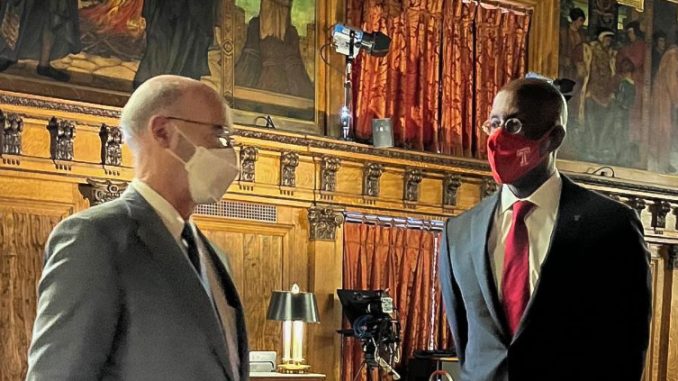
Temple University President Jason Wingard made his first trip to Harrisburg alongside Board of Trustees Chairman Mitchell Morgan to meet with Pennsylvania Gov. Tom Wolf on Jan. 11 to discuss the state’s appropriations to Temple.
This year, Temple requested a 3 percent increase — around $4.6 million — in state appropriations to provide discounted tuition for in-state students, said Ken Kaiser, senior vice president for finance and operations and chief administrative officer. Every September, Temple requests appropriations from the state’s budget office, for the following fiscal year, that will be used to provide a tuition discount, he said.
Besides state appropriations, Wolf and Wingard discussed higher education in the United States, job availability in Pennsylvania and how Temple could contribute to the workforce, Wingard’s office wrote in a statement to The Temple News.
“The governor enjoyed the discussion with President Wingard and Chairman Morgan,” wrote Elizabeth Rementer, Wolf’s press secretary, in a statement to The Temple News. “The governor was pleased to learn about Temple’s continued growth in the City of Philadelphia and vision.”
For the last three years, Temple has received a flat state appropriation of roughly $158.2 million, after receiving an increase in state appropriations during Fiscal Year 2019 from $155.1 million to the current amount. The last time the university’s state appropriations decreased was in Fiscal Year 2012 during former Gov. Tom Corbett’s administration, Kaiser said. A year later, Corbett proposed to keep Temple’s funding the same, PennLive reported.
Maintaining contact with Harrisburg officials helps Temple sustain relationships with state officials and communicate the university’s need for appropriations, said Dennis Lynch, assistant vice president of government relations.
Temple regularly lobbies Harrisburg, including the governor’s office, the budget office or the general assembly, by phone or by travelling to the state capitol, to discuss state appropriations, Lynch said.
“We explain the impact and the importance of the appropriation at Temple, the number of students that benefit from the state appropriation, so we keep all those things in mind as we advocate on behalf of Temple students,” Lynch said. “We try to explain the importance, what we use it for and the overall impact.”
Temple and three other universities — Pennsylvania State University, University of Pittsburgh and Lincoln University — are all state-related universities and can receive financial support from Pennsylvania.
After submitting the request, Wingard and a small team — usually comprised of communications, government relations and finance staff members — will join the presidents of the other three state-related universities in Harrisburg on March 8 to make their case for increased appropriations for the next fiscal year and answer questions at hearings hosted by the state Senate and the state House of Representatives, Kaiser said.
“Like fundraising, we’re not going to go and immediately ask somebody for a very large gift,” Kaiser said. “You need to cultivate them, take them to dinner and you listen to them, you know you bring them to a Temple basketball game, and the same is true with the government. You need to establish those relationships and make sure they really understand what Temple’s mission is.”
The governor will also include, in his budget, a preliminary estimate of his potential funding for the state-related universities like Temple, but the budget won’t be finalized until it is passed by June 30, Kaiser said.
Wolf will release his budget on Feb. 8, ABC27 reported.
Despite not seeing an increase in appropriations for the past three years, Lynch believes that Temple’s continued advocacy efforts in Harrisburg are maintaining the university’s state appropriations because Temple has opportunities to communicate their needs with state officials.
“The President understands that Temple University has a long-standing partnership with Harrisburgh and the Commonwealth,” Wingard’s office wrote. “We receive financial support, and in exchange provide discounted tuition to Pennsylvania residents, creating economic opportunity and highly engaged, productive citizens.”



Be the first to comment